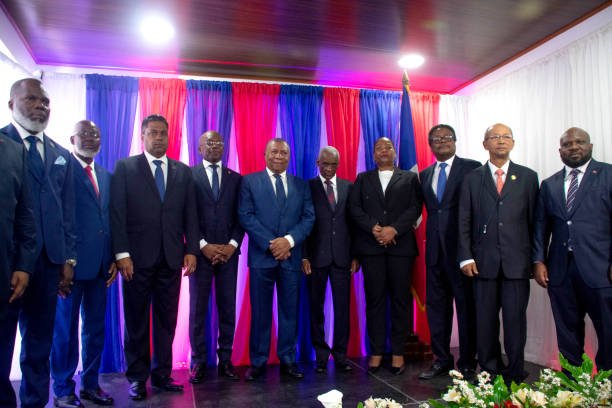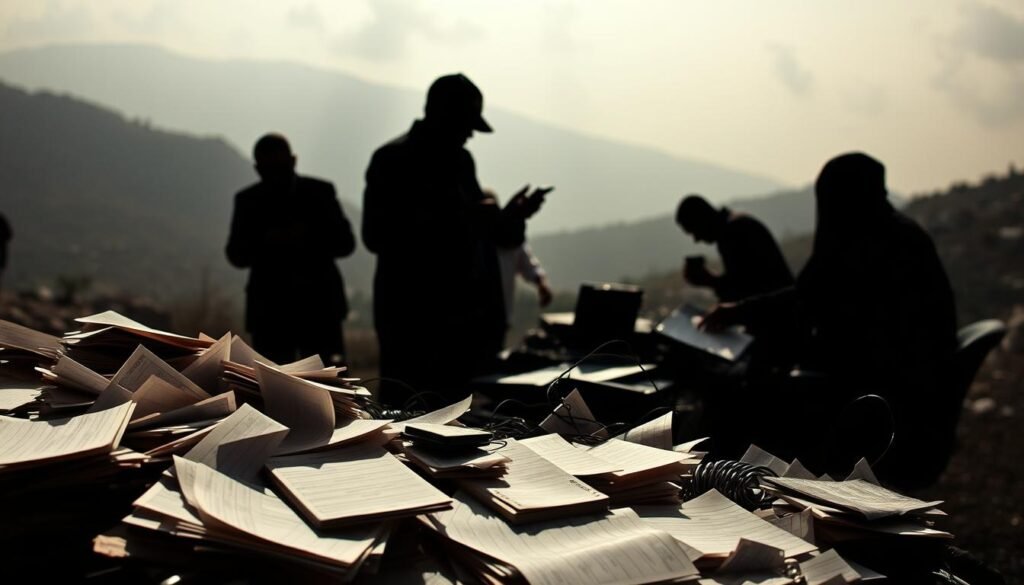Physical Address
304 North Cardinal St.
Dorchester Center, MA 02124
Physical Address
304 North Cardinal St.
Dorchester Center, MA 02124

Haiti's TPC: A vehicle for corruption and looting, not true governance. Discover the "Governance Illusion" in this eye-opening article.
Haiti’s Transitional Presidential Council (TPC) has been a subject of controversy, with many questioning its true purpose. Rather than promoting good governance, it appears to be a vehicle for corruption and looting.
The TPC’s actions have led to a governance illusion, masking the real issues that plague Haiti. Corruption and looting have become rampant, undermining the country’s stability.
It’s crucial to understand the implications of TPC’s actions and how they affect Haiti’s future. By examining the role of TPC in perpetuating corruption, we can begin to address the root causes of these issues.
The assassination of President Jovenel Moïse marked a critical turning point in Haiti’s political crisis. This event not only shocked the nation but also triggered a series of power struggles and political instability.
On July 7, 2021, President Jovenel Moïse was assassinated at his private residence in Port-au-Prince. This tragic event sent shockwaves across the country and into the international community.
In the immediate aftermath, chaos and confusion gripped the capital as various factions vied for control. The lack of clear leadership created a power vacuum that exacerbated the crisis.
As different political groups and individuals sought to fill the void left by President Moïse, political fragmentation intensified. This power struggle further destabilized the country.
The assassination led to an escalation of gang violence as various criminal organizations took advantage of the weakened state authority.
Gang violence has been a persistent issue in Haiti, and the power vacuum following Moïse’s assassination allowed it to surge.
In response to the crisis, there were proposals for foreign intervention, aimed at stabilizing the country. However, these proposals were met with mixed reactions from the Haitian populace and political elite.
The complex interplay of these factors has set the stage for the formation of the Transitional Presidential Council (TPC) and the ongoing challenges it faces in addressing Haiti’s deepening political crisis.
In the wake of political turmoil, the Transitional Presidential Council (TPC) emerged as a potential solution to Haiti’s governance crisis. The TPC was formed to address the power vacuum following significant political upheaval.
The TPC was established through the March 2023 Agreement, a pact aimed at stabilizing Haiti’s political landscape. This agreement outlined the council’s primary objectives, including the organization of democratic elections within a specified timeline.
The March 2023 Agreement was a landmark deal that brought together various political stakeholders to form the TPC. Its key provisions included:
The TPC promised to hold democratic elections within a specified timeline, aiming to restore democratic governance in Haiti. This timeline was seen as a crucial step towards legitimizing the council’s authority and transitioning power to elected officials.
The TPC comprises various members, each with distinct backgrounds and political affiliations. Understanding its structure is crucial to assessing its effectiveness.
The council includes representatives from different political parties and civil society organizations. Some key members have been:
The TPC has garnered significant international recognition and support, with various countries and international organizations backing its formation and objectives. This support is seen as crucial for the council’s legitimacy and operational capacity.
Beneath the facade of democratic governance, Haiti’s Transitional Presidential Council (TPC) operates as a vehicle for corruption, siphoning off resources meant for the Haitian people. The TPC was established with the promise of guiding Haiti towards a more stable and democratic future, but its actions have revealed a different agenda.
The TPC’s formation was met with international approval, and it was touted as a necessary step towards democratic elections. However, the reality on the ground tells a different story.
Despite initial promises, the TPC has consistently delayed elections, citing various reasons ranging from security concerns to logistical challenges. This delay has not only prolonged the political uncertainty but has also given the TPC unchecked power to manage the country’s affairs without accountability.
The repeated postponement of elections has been a significant factor in eroding trust in the TPC. For instance, the local business community has expressed concerns over the lack of a stable political environment, which is crucial for investment and growth.
Corruption within the TPC is multifaceted, involving various mechanisms that allow council members to exploit their positions for personal gain.
There have been several documented cases where funds allocated for development projects were misappropriated by TPC officials. For example, a recent audit revealed that millions of dollars intended for infrastructure development were diverted into private accounts.
| Year | Amount Misappropriated (USD) | Project |
|---|---|---|
| 2022 | 5,000,000 | Road Infrastructure |
| 2023 | 3,000,000 | Public Health Initiative |
Nepotism and favouritism have been rampant in the TPC’s appointment processes. Key positions have been filled by relatives and close associates of council members, further entrenching corruption.
The TPC’s actions have not only undermined Haiti’s democratic aspirations but have also perpetuated a cycle of corruption and mismanagement. The international community must take a closer look at the TPC’s operations and hold its members accountable.
A closer look at the financial dealings of Haiti’s Transitional Presidential Council (TPC) reveals a troubling pattern of mismanaged funds and a lack of transparency. The mismanagement of financial resources has not only hindered the council’s ability to address Haiti’s pressing issues but has also led to widespread distrust among the Haitian populace and international donors.
The TPC has been accused of misusing millions of dollars in aid funds. Despite receiving substantial financial aid, the council has failed to deliver on its promises, leaving many to question where the money is going.
| Aid Package | Amount | Outcome |
|---|---|---|
| USAID Relief Package | $10 million | Funds allocated, but no visible projects |
| UN Emergency Fund | $5 million | No public records of fund utilization |
| EU Humanitarian Aid | $15 million | Partially used; remaining funds unaccounted for |
The TPC’s lack of financial transparency has been a significant concern. Without clear financial records, it is challenging to assess the true extent of the council’s mismanagement.
There has been a notable absence of auditing and oversight mechanisms within the TPC. This lack of accountability has created an environment conducive to financial misconduct.
“The lack of transparency and oversight in the TPC’s financial dealings is a recipe for disaster. It undermines trust and enables corruption.” –
Allegations have surfaced regarding the personal enrichment of TPC members. There are reports of council members experiencing unexplained wealth and lifestyle changes.

The financial mismanagement within the TPC not only jeopardizes Haiti’s development but also erodes the trust between the government and its people. Measures must be taken to ensure transparency and accountability within the council.
Behind the facade of the TPC lies a complex web of power brokers shaping Haiti’s future. Understanding who these power brokers are and how they influence the TPC is crucial to grasping the true nature of Haiti’s governance.
The TPC is heavily influenced by Haiti’s political elites, who have significant interests at stake. These elites often have business connections and conflicts of interest that shape the TPC’s decisions.
Many members of the TPC have ties to influential business groups, which can lead to decisions that benefit these groups at the expense of the general population. For instance, a TPC member might push for policies that favour a particular industry in which they have a financial stake.
Foreign powers also play a significant role in shaping the TPC’s agenda. The influence of foreign governments can be seen in the TPC’s policy decisions, which sometimes align more closely with foreign interests than with the needs of Haitian citizens.
The United States, in particular, has a significant impact on the TPC. However, US policy towards Haiti is often contradictory, promoting democratic governance while supporting structures like the TPC that may undermine it.
Criminal organizations have infiltrated the TPC, further complicating Haiti’s governance. These organizations often form alliances with political figures, creating a dangerous nexus of power.
Gangs in Haiti have formed alliances with political figures, including those within the TPC. This has led to a situation where criminal interests significantly influence governance.
Haiti’s TPC has struggled to deliver on its promises, with the country’s security situation, economic stability, and humanitarian crisis worsening under its leadership. The council’s inability to address these critical issues has led to a deterioration in the overall governance of Haiti.
The security situation in Haiti has significantly worsened since the TPC took over. Violence and kidnappings have become more frequent, creating a climate of fear among the population.
Recent statistics indicate a sharp rise in violent crimes:
The TPC’s failure to address these security concerns has left citizens feeling vulnerable and unprotected.
The TPC’s economic policies have been ineffective, leading to a decline in Haiti’s economic stability. Inflation has soared, and the local currency has depreciated significantly against major foreign currencies.
The economic mismanagement is evident in the following statistics:
These economic challenges have had a devastating impact on the Haitian population, particularly the poor.
The humanitarian situation in Haiti has also deteriorated under the TPC. Food insecurity has increased, and the healthcare system is on the brink of collapse.
The consequences of the TPC’s failures are stark:
The TPC’s inability to address these humanitarian challenges has further entrenched the suffering of the Haitian people.
Ordinary Haitians are bearing the brunt of the TPC’s ineffective governance. The consequences of the TPC’s actions have been dire, impacting the daily lives of citizens across the country.
The economic situation in Haiti has deteriorated significantly under the TPC. Poverty levels have risen, and the gap between the rich and the poor has widened.
The disparity between urban and rural areas has become more pronounced. Rural communities lack access to basic services, exacerbating their poverty.
The unstable environment has led to increased displacement and migration. People are forced to leave their homes in search of safety and better living conditions.
According to recent statistics, thousands of Haitians have been internally displaced due to the prevailing insecurity and economic hardship.
| Year | Internally Displaced Persons |
|---|---|
| 2022 | 13,000 |
| 2023 | 20,000 |
Many Haitians undertake perilous journeys to other countries, seeking refuge and a better life. This migration poses significant risks, including exploitation and loss of life.
The TPC’s failure to address the country’s issues has led to a significant loss of faith in governance institutions among Haitians.
Public opinion surveys indicate widespread dissatisfaction with the TPC. Protests have become common, with citizens demanding change and better governance.
The international community’s role in Haiti’s governance crisis is multifaceted, involving various foreign powers that inadvertently or deliberately enable corruption. The Transitional Presidential Council (TPC), established to guide Haiti towards stability, has been significantly influenced by external actors.
The United States has historically played a significant role in Haitian politics, and its policies have a substantial impact on the TPC’s functioning. Contradictions in US-Haiti policy have been observed, where the rhetoric of supporting democracy contrasts with actions that enable corruption.
US support for certain political figures in Haiti has raised questions about its commitment to a genuine democratic transition. The provision of aid, while crucial for humanitarian needs, is sometimes tied to conditions that favour specific political outcomes.
The United Nations, along with other international organizations, has been involved in Haiti for decades, providing peacekeeping forces and humanitarian aid. However, failed oversight mechanisms have allowed corruption to flourish within the TPC.
The lack of effective monitoring and accountability measures by international organizations has enabled financial mismanagement and corruption within the TPC. This oversight failure has contributed to the perpetuation of the governance illusion.
Regional actors, such as the Dominican Republic and CARICOM member states, have their own interests in Haiti’s political stability. Their positions on the TPC reflect a mix of geopolitical and economic considerations.
The Dominican Republic, sharing a border with Haiti, has significant interests in Haiti’s stability, while CARICOM’s involvement reflects a regional commitment to Haiti’s democratic transition. However, their support for the TPC has been criticized for lacking transparency.

Haiti’s governance crisis calls for innovative solutions that focus on grassroots movements and genuine international partnerships. The traditional top-down approach has failed to deliver meaningful change, highlighting the need for alternative paths that prioritize community needs and participation.
Grassroots democratic movements have the potential to drive real change in Haiti. These movements are characterized by their focus on community-led initiatives and participatory governance.
Several community-led initiatives have shown promise in Haiti, including projects focused on education, healthcare, and economic development. For example, some organizations have established community centers that provide vital services and serve as hubs for local activism.
To ensure that governance is truly representative and effective, accountability mechanisms and transparency are crucial. This can be achieved through independent oversight bodies and open data initiatives.
Countries facing similar governance challenges have implemented successful anti-corruption models. For instance, some nations have established independent anti-corruption agencies with the power to investigate and prosecute corruption cases.
The role of international partners in Haiti’s governance is complex. While foreign aid and support are crucial, it’s essential to distinguish between genuine international partnership and intervention.
Foreign aid can be beneficial when it is aligned with the needs and priorities of the Haitian people. This requires a shift towards more collaborative and less conditional aid models.
Haiti’s Transitional Presidential Council (TPC) has failed to deliver on its promises, instead perpetuating a cycle of corrupt governance and mismanagement. The TPC’s structure and composition have allowed for the concentration of power and the exploitation of Haiti’s resources.
To break this cycle, it is essential to establish a genuinely democratic process, with a government that is accountable to the Haitian people. This requires a fundamental shift in the way power is exercised and the implementation of robust accountability mechanisms.
The international community has a crucial role to play in supporting Haiti’s development, but this support must be provided in a way that respects the country’s sovereignty and promotes transparency. By working together, it is possible to create a more equitable and just society in Haiti, one that is free from the grip of corrupt governance.
The path forward will require sustained effort and commitment from all stakeholders, including the Haitian government, civil society, and international partners. By prioritizing the needs of the Haitian people and promoting good governance, we can break the cycle of corrupt governance and build a brighter future for Haiti.
The Transitional Presidential Council (TPC) is a governing body established in Haiti as part of a political agreement aimed at transitioning the country towards democratic elections.
Critics argue that the TPC has failed to deliver on its promises, engaging in corruption, looting, and mismanaging funds, thereby exacerbating Haiti’s political and economic crisis.
There have been allegations of mismanagement and misappropriation of aid funds allocated to the TPC, with significant amounts disappearing without transparent accounting.
Ordinary Haitians have suffered greatly under the TPC’s governance, facing deepening poverty, displacement, increased violence, and a general deterioration in living conditions.
Yes, there are discussions around grassroots democratic movements and genuine international partnerships as potential alternatives to the current governance structure, focusing on transparency and accountability.
Foreign powers, including the United States and international organizations like the UN, have been criticized for their role in enabling corruption within the TPC through their policies and lack of effective oversight.
Proposed solutions include supporting grassroots democratic movements, implementing robust accountability mechanisms, and fostering genuine international partnerships that prioritize transparency and the needs of the Haitian people.
The international community can play a crucial role in supporting Haiti’s governance by promoting transparency, providing aid that is tied to performance and accountability, and backing grassroots movements that advocate for democratic change.